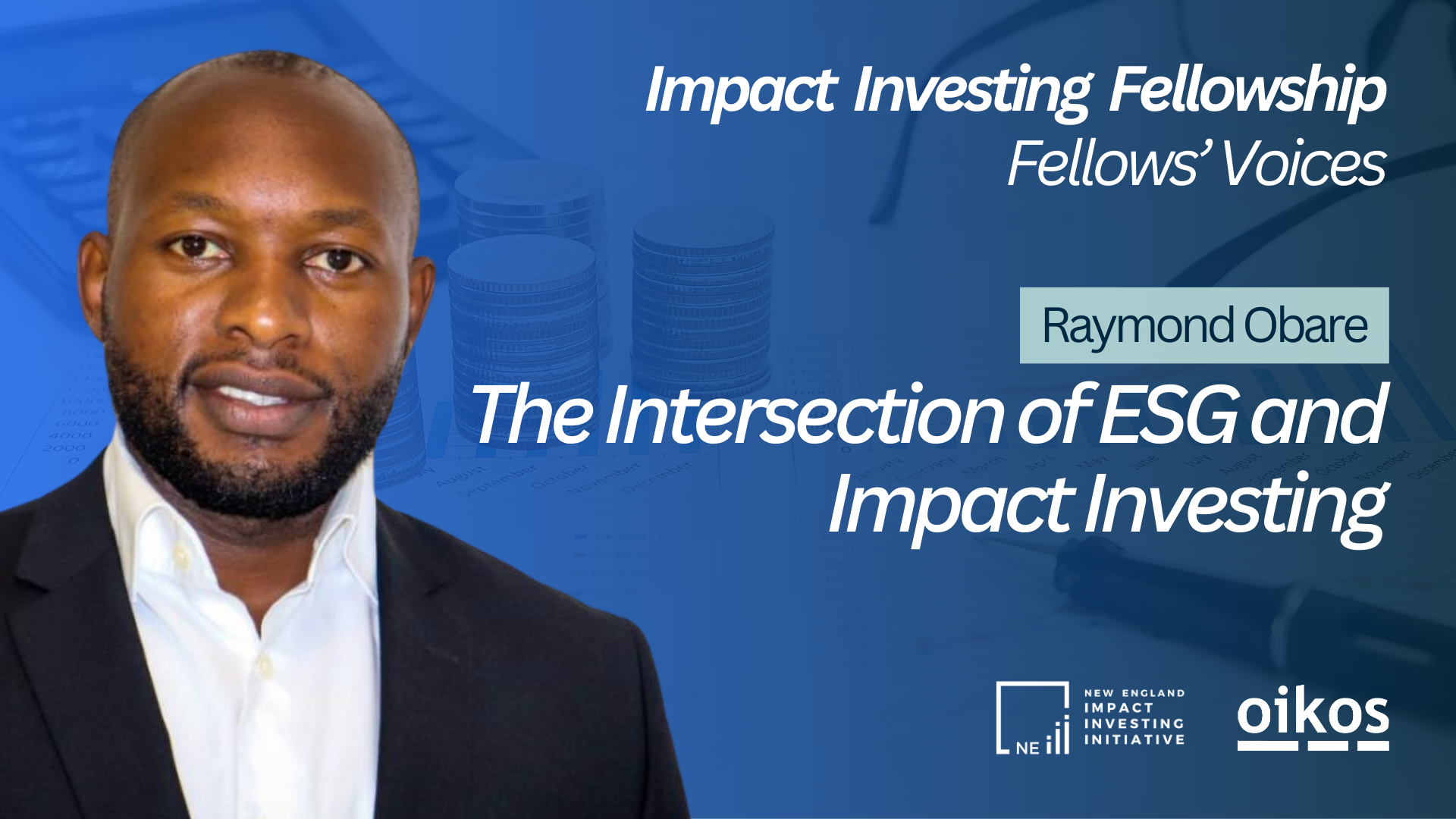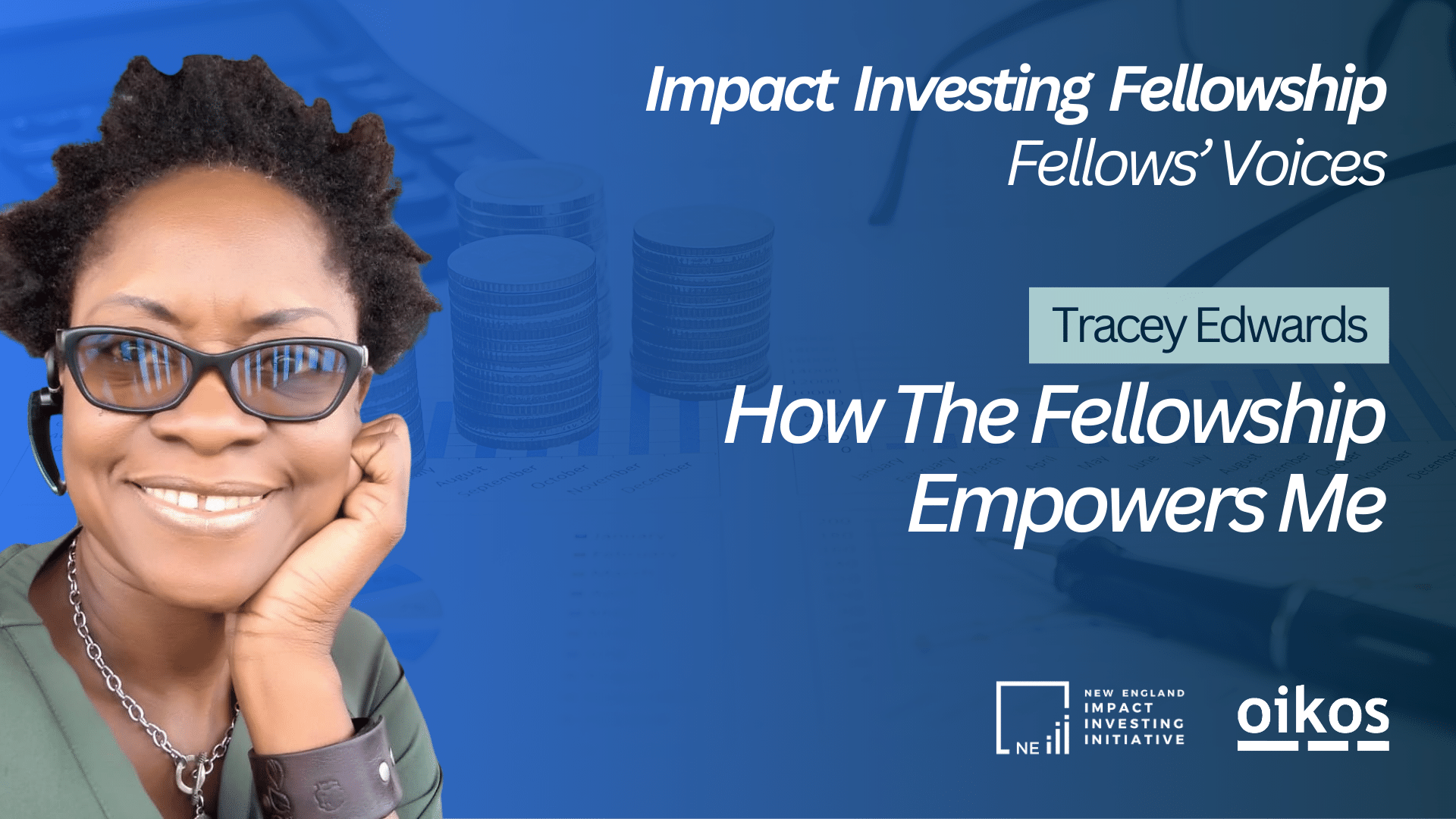
As part of this series on our programs, we had the Fellows share their own voices as we learn a bit about what they are getting from this learning journey. Check out this reflection from Raymond. He is from Kenya and is working as an Impact Consultant specializing in ESG in his home country. Raymond enjoys writing about impact investing and has collaborated with our partner Impact Entrepreneur. Check out his “Voice” below and connect with him on LinkedIn.
Note: As part of the Impact Investing Fellowship, our Fellows get access to training programs and knowledge sessions. We empower our participants to see the possibility in creating real world impact with the financial system by learning about the forward-thinking organizations and programs that are spreading sustainable finance and impact investing. We work to transform education and empower the future finance leaders and impact creators.
Learn more here – https://www.neiii.org/thefellowship
The Fall 2024 Fellowship will be starting soon and you and your network can join for future events and workshops. The Fellowship provides a place to connect with the impact investing space and develop your knowledge and skills.
Navigating the Intersection of Impact Investment and Environmental Social Governance (ESG): A Pathway to Sustainable Growth
Impact investment and ESG have emerged as vital tools for aligning financial goals with societal and environmental values. While impact investment seeks measurable positive social or environmental impact alongside financial returns, ESG criteria evaluate a company’s performance on key sustainability metrics. These two approaches intersect in their commitment to sustainable development and responsible business practices. Understanding this intersection is crucial for investors looking to drive positive change while achieving financial objectives.
Impact investment goes beyond traditional philanthropy by leveraging capital markets to address social and environmental challenges. It focuses on generating measurable, beneficial outcomes (social and environmental) alongside financial returns. Whether investing in affordable housing, renewable energy, or healthcare innovation, impact investors seek opportunities to create tangible improvements in society while earning a profit.
From the informative session New England Impact Investment Fellows (NEIII), Spring 2024 Cohort held with Ms Jennifer N. Coombs, Director of Client Success, ACA Group, she reiterated the value of ESG as criteria to evaluate a company’s performance in three key areas: environmental impact, social responsibility, and corporate governance. Environmental factors include a company’s carbon footprint, resource use, and waste management. Social considerations encompass labor practices, diversity and inclusion, and community engagement. Corporate governance evaluates factors such as board diversity, executive compensation, and transparency. By integrating ESG criteria into investment decisions, investors can mitigate risk, enhance long-term financial performance, and contribute to a more sustainable economy.
The intersection of impact investment and ESG criteria lies in their shared goal of promoting sustainability and responsible business practices. Impact investors often incorporate ESG factors into their investment decisions to ensure that their capital generates positive outcomes while minimizing negative externalities. Similarly, companies that adhere to strong ESG standards are more likely to attract impact investment capital, as they demonstrate a commitment to long-term value creation and stakeholder well-being. For example, a renewable energy project may align with both impact investment goals and ESG criteria. From an impact perspective, the project contributes to reducing carbon emissions and advancing clean energy adoption, thus addressing environmental challenges. From an ESG standpoint, the project’s adherence to sustainable practices, such as minimizing ecological impact and engaging with local communities, enhances its social and governance credentials.
The convergence of impact investment and ESG criteria offers several benefits for investors, companies, and society at large. By integrating sustainability considerations into investment decisions, investors can drive positive change, mitigate risk, and potentially achieve competitive financial returns. Companies that prioritize ESG factors can enhance their resilience, reputation, and access to capital, while contributing to global sustainability goals.
However, navigating this intersection also presents challenges. Assessing the impact and effectiveness of investments requires robust measurement frameworks and data collection mechanisms. Furthermore, balancing financial returns with social and environmental impact goals may require trade-offs and compromises, particularly in sectors facing systemic challenges or market constraints. As the demand for sustainable and responsible investment continues to grow, the intersection of impact investment and ESG criteria will play an increasingly important role in shaping the future of finance. Investors, companies, and policymakers must collaborate to develop standardized metrics, reporting frameworks, and best practices to guide decision-making and promote transparency.
Moreover, fostering a culture of accountability and stakeholder engagement is essential for driving meaningful change and ensuring that impact investment and ESG integration deliver tangible benefits for society and the planet. By aligning financial incentives with sustainable development objectives, we can harness the power of capital markets to build a more inclusive, resilient, and equitable world for future generations. The intersection of impact investment and ESG criteria represents a dynamic and transformative force in the world of finance. By integrating social and environmental considerations into investment decisions, stakeholders can create value not only for shareholders but also for society and the environment. As we navigate this intersection, let us seize the opportunity to drive positive change and build a more sustainable and prosperous future for all.
Raymond Obare
Impact Consultant
Professional Profile – Raymond Obare
Raymond is a policy development Professional with a bias in assisting nonprofits and enterprises mainstream climate action within their operations and project implementation. Raymond has an undergraduate degree in Disaster Mitigation and Sustainable Development from Masinde Muliro University of Science and Technology and finalizing a graduate degree in Masters in Research and Public Policy from University of Nairobi. Raymond is also a technical assistance provider and has previously consulted with United Nations Climate Technology Centre Network for Zambia, Zimbabwe, Kenya, and Malawi.
Raymond has worked on advocacy and influencing of several policies including but not limited National Sustainable Waste Management Act 2022, Extended Producer Responsibility Regulations 2021 (draft) and the Plastic ban regulations in all protected areas in Kenya. In his free time, Raymond enjoys a good morning run and intensive workout gym session.




